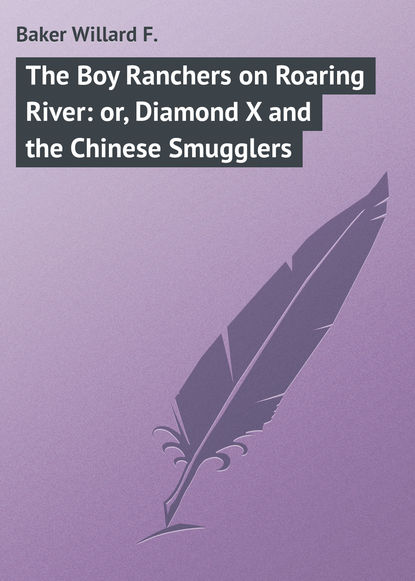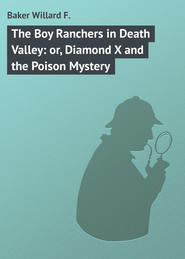По всем вопросам обращайтесь на: info@litportal.ru
(©) 2003-2024.
✖
The Boy Ranchers on Roaring River: or, Diamond X and the Chinese Smugglers
Настройки чтения
Размер шрифта
Высота строк
Поля
The Mexican shrugged his shoulders and motioned toward the kitchen.
"Boss leave it here?"
Another shrug.
"Now listen, Mex. You know what I mean. You nod or shake your head when I ask you questions." Yellin' Kid walked over and stood before the Mexican.
"First, did you work for this guy Delton?"
A nod.
"Then when he beat it, you stayed here, hey?"
A nod.
"Why?"
"He can't answer that with his head, Kid," Nort broke in.
"I know it, but maybe he can tell us by motions. Hey? Why you no go with Delton?"
The Mexican pointed toward himself, then to the kitchen. His hands simulated the job of peeling potatoes. Then he flung both arms wide, and moved his head in a semi-circle, eyes opened as though he were looking for something.
"So he went when you were in the kitchen, hey, an' didn't say nothin' about it. Well, that sounds logical."
"Kid, for Pete's sake, let's eat!" Bud interrupted. "You did fine – give you a badge as a special detective. All right, Mex, outside. Gee, you certainly are curious, Kid!"
"I just want to know a few things, that's all," Yellin' Kid protested. "I don't want to get poisoned. Can't tell who that Mex is – for all we know he may be one of Delton's men left here to watch us."
"Say, I was thinking the same thing," Dick put in. "But his graphic explanation as to why he's here seems to be at least plausible. If, as Billee suggested, Delton cut out when he found there was a price on his head it doesn't seem reasonable that he'd bother taking the cook along. How about it, Billee?"
"Ain't makin' no statements," the veteran rancher replied slowly. "Want to think things out a few minutes first."
"Billee's going to solve the great mystery for us!" Nort laughed. "Never you mind, ole horse, you knew your stuff when you grabbed that bill-head from Hawkins's office. The trouble with us was, we were too slow."
The conversation hit on the topics of the night before as the ranchers made a healthy breakfast. When they had satisfied their hunger Bud leaned back in his chair and said:
"Well, what's on the program this morning, Kid? Beckon you better take charge for a while. Then Dick can be head boss, and so on – 'til we get the sheep in. O. K.?"
"All right with me, Bud," the Kid agreed. "One of us wants to take a ride into town and see about gettin' hold of a sheep-man. I got to get me a pony, too."
"I'll go," offered Nort. "Think I'll look up Hawkins. He might like to know what happened."
The five walked slowly into the yard. The meal seemed to change their ideas, and set them quietly to thinking. Bud was leaning against the side of the ranch house. The Kid strolled over to the corral and looked longingly at the four horses tethered there. Billee Dobb was seated on the steps smoking his pipe, when he noticed a cloud of dust in the distance.
"Rider," he said, more to himself than to the others. "Got a hunch who it is."
The dust cloud grew quickly nearer, and from it emerged the figure of a man on horseback.
"Someone coming," Dick called.
"Who is it?" Bud asked. From where he stood he was unable to see.
"Don't know yet. Looks familiar, though. Here he comes."
"It's Joe Hawkins!" exclaimed Bud, as the horseman rode into view. "Hi, Joe – Mr. Hawkins, I mean."
"Joe'll do, son," the deputy said with a smile as he dismounted. "Looks like you was havin' a convention here."
"Just thinking things over," the Kid, who had walked up, explained. "Glad you came, Mr. Hawkins."
"Thought that was you," Billee Dobb said, rising to his feet and removing the pipe from his mouth. "Seen you way off, and says to myself, bet that's Joe Hawkins."
"You got good eyes," laughed the deputy.
"Oh, it wasn't exactly my eyes. I had a hunch."
"Billee Dobb is our official detective," Bud said with a grin. "Tell him about the hand-bill you copped, Billee."
Explanations were in order, and with continuous interruptions the deputy finally heard the story of the cyclone and what followed. He questioned the boys as to the appearance and talk of Delton, and at last confessed that he must be the man wanted.
"Though I didn't think they knew just who he was," Hawkins added. "All I knew was that the reward of two thousand was for the head of the smuggling system. So they got him spotted, have they? That means we won't have to work in the dark. It's a wonder the central office wouldn't give a man the whole story when they're about it, instead of lettin' it trickle through. Well, boys, it's time you knew what this smuggling is all about, hey?"
CHAPTER XII
THE STORY OF SMUGGLING
"Between this country and Mexico," began the deputy, "there's a strip of land called the border – on one side U. S., and on the other Greaser-land. You know all about that. Across this border run several roads – passages into and from Mexico. And each of these roads is patroled by United States officers.
"These men are placed there for a purpose, and one purpose among others is to prevent the illegal sending into the States of Chinamen. You see only so many foreigners from each nation are allowed to settle in the United States each year, and once that quota is reached, no more will be admitted. Naturally there are always men who want to come to the "Land of Plenty" and make their fortunes, but unless these men are within the quota for that year, they are forbidden to enter. All Chinese are forbidden entry and have been for several years.
"But there are ways and means of getting around that situation. Suppose a Chinaman wants to become rich. The first thing he thinks about is America. All he has to do in America, he thinks, is to bend over and pick up the gold pieces that are lying in heaps all over the streets.
"So the Chinaman makes up his mind to come to America. He goes to Foy Lee, a slick friend of his, to find out about it. Foy Lee says 'Good thing you see me. Sure. I fix you up. Easy. You want go America? All light. Can do. You got fifteen hundred dollah?' Now where would a poor Chink get fifteen hundred dollars? He tells Foy Lee there ain't that much money in the world. So Foy Lee starts thinkin'. He rubs the top of his head, blinks his eyes, and grunts twice. Then he says, 'you still want go America?' 'Sure!' our Chink answers. 'All light,' says Foy Lee. 'You come with me.' The rascal knows all the time what to do, only he wants to make it seem hard, so he can get his little rake off.
"Foy Lee takes his friend to an office over on a side street in some Chinese city. There he meets a man who guarantees him passage to U. S. if the Chink will just sign the paper. That's all – no money nor nuthin' – only sign the paper an' he gets to America. What is the paper? Oh, just a promise that the Chink will pay the company that's sending him all his future wages – less enough for food – until fifteen hundred dollars have been paid. Just a mere matter of slavery, that's what it amounts to.
"But the Chink signs. What's fifteen hundred in the land of 'plenty dollah?' Now our Chink is put on a vessel bound for Mexico. There he is met by an agent of the same company that put him on board in China.
"This agent takes him to a town, near the border – say Presidio, or some such place. Then the real fun begins. The company notifies their man at headquarters that the Chink has arrived and is ready to be shipped across the border. Headquarters looks up the Chink's bond that he signed in China, and which has been received through the mail, and sends back word that everything is O. K., that the Chink, with several others, is to be handed to a smuggler at a certain spot, to be smuggled over the border. And when the Chink is so delivered the company's part ends.
"After this the Chink's fate is in the hands of the smugglers, and if they get caught, and the poor coot is sent back to China again by the emigration authorities, he's still got to pay that fifteen hundred, although all he got for his money was a long ride and hard treatment.
"The border runners take their consignment of Chinese and either pack them in the back of an auto or wagon, or arrange to smuggle them across some other way. If they're lucky, they get through. If not they get hauled up by the border officers, and the runners get jail and the Chinks are sent back to their native land. And even if they do get through the lines the Chinks' troubles aren't over, for at any time they're liable to be pulled in for not having what they call a 'chock gee,' which is a government paper signifying they are here lawfully and not by smuggling. I told you about that before.
"And that's how the game works. These smugglers get hold of a ranch near the border so they can hide their Chinks when they get them across, until the time is set to turn them loose. 'Course I can't say that's what this place has been used for. But it would be great for it."
The narrator paused and the Boy Ranchers drew long breaths of excitement.










